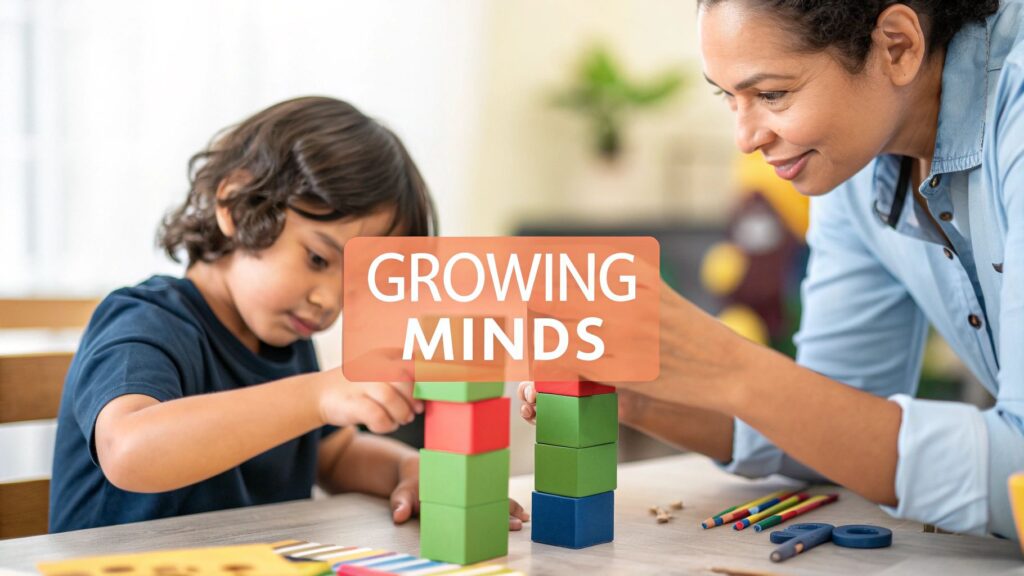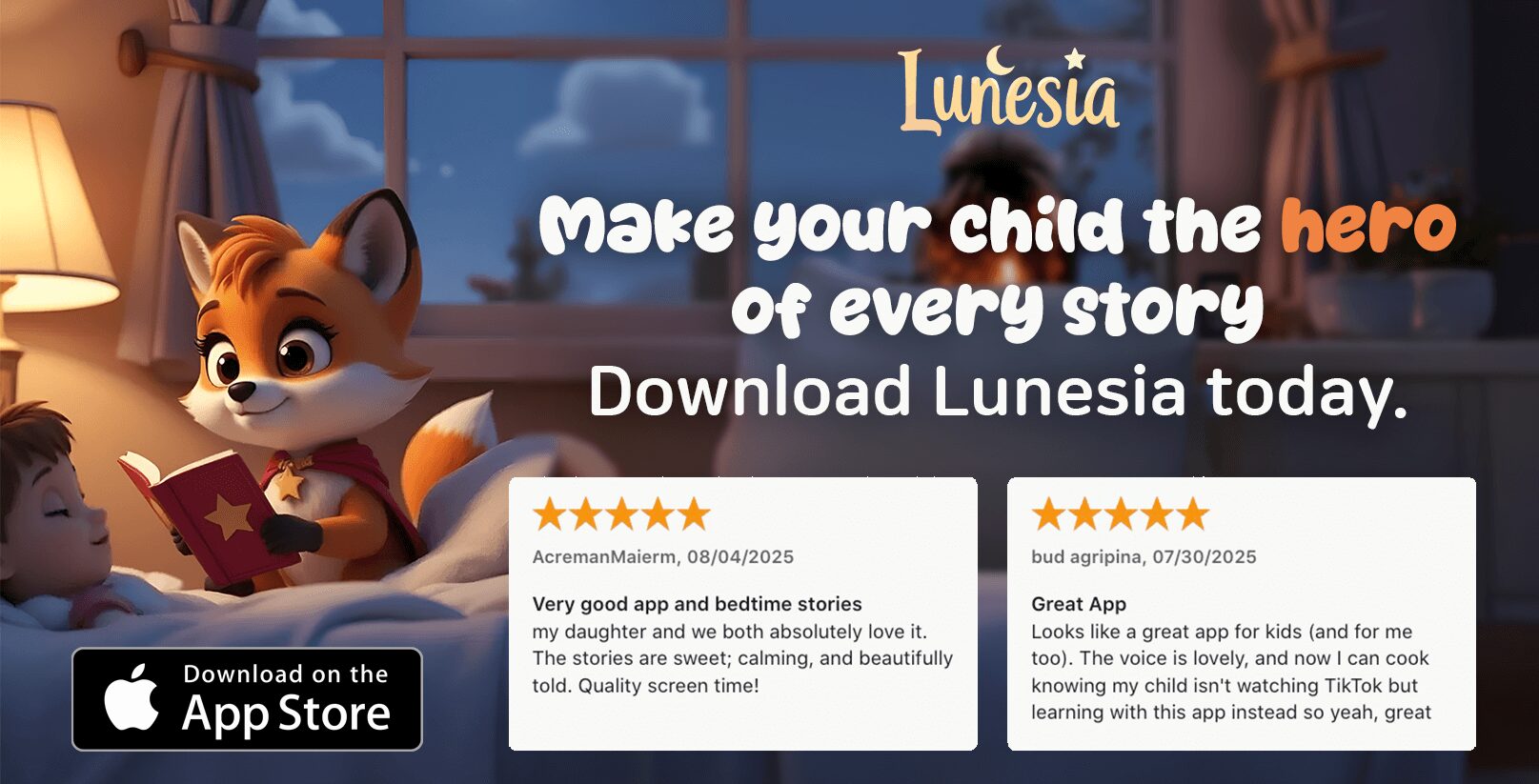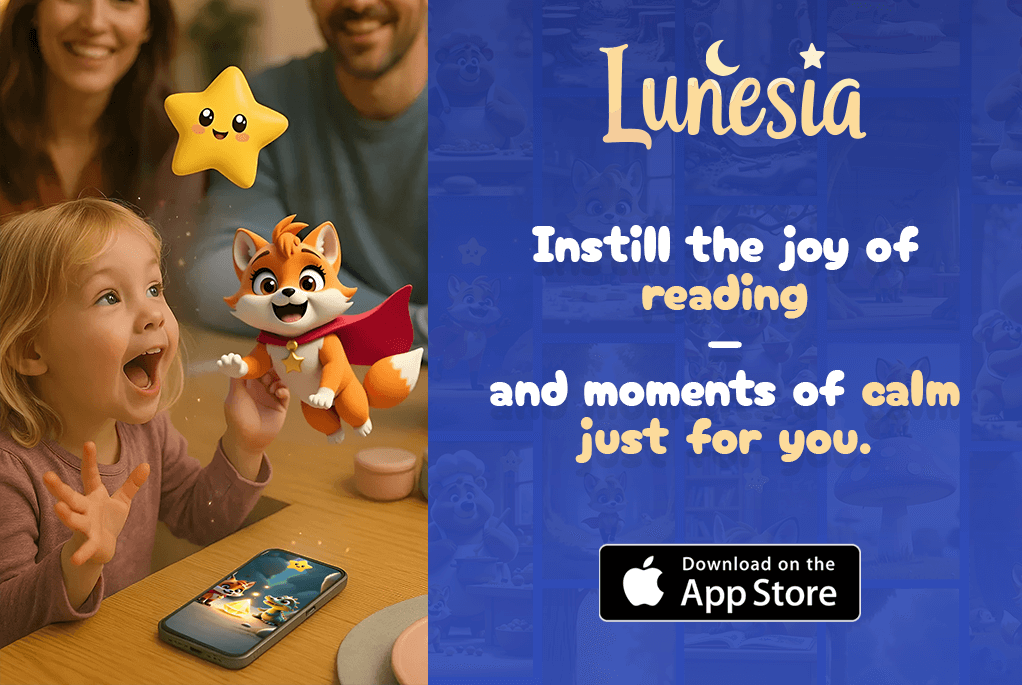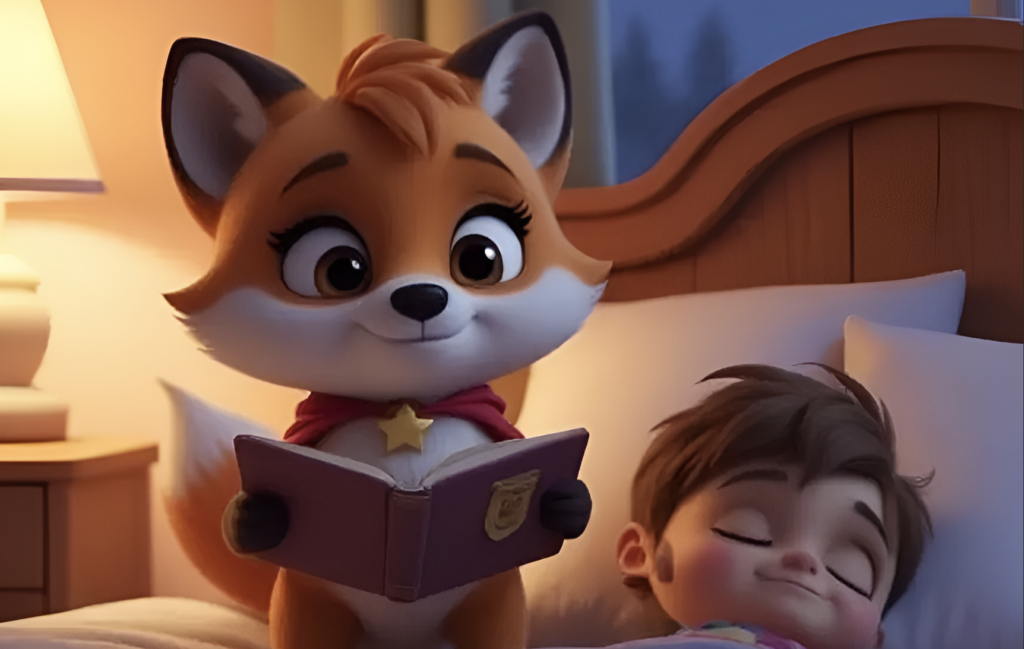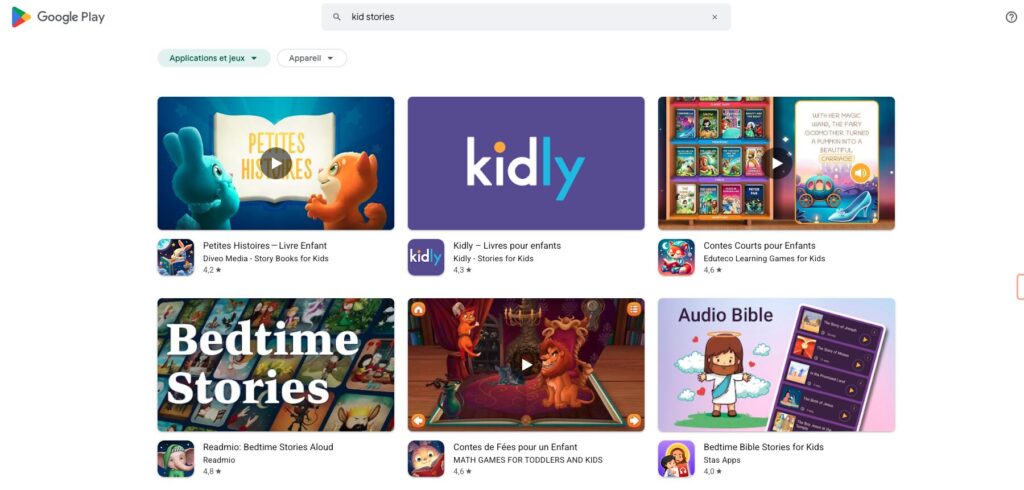Ever wondered what's really going on inside that little head of yours? Cognitive development is the magical, messy, and truly mind-blowing process of how your child learns to think. It’s the journey from simply seeing the world to understanding it, solving its puzzles, and imagining entirely new ones. Forget flashcards for a moment. This is about building the mental toolkit they'll use for problem-solving, memory, and creativity for the rest of their lives. Every single "why?" is their brain's engine revving up.
Your Child’s Brain is a Construction Site
Have you ever watched your child trying to stack blocks, their little brow furrowed in concentration? That’s not just a game. It's a tiny neurological masterpiece unfolding right before your eyes. Between the ages of two and seven, their brain is firing on all cylinders, forming connections at a pace it never will again. This period is literally laying the foundation for all future learning.
Think of it like building with mental LEGOs. One by one, they are constructing the abilities that let them remember where they hid their favorite teddy bear, solve the puzzle of a shape sorter, or imagine that a plain old cardboard box is actually a rocket ship headed for the moon. It might look like chaos, but there's a predictable and fascinating progression happening under the surface.
This is why understanding the benefits of early intervention in supporting child development is so important; the support a child receives during these foundational years can shape their cognitive, social, and emotional growth for years to come.
The Blueprint for a Brilliant Mind
So, what exactly is happening during this incredible construction project? Researchers have a few different "blueprints," or theories, but they all point to the same incredible outcome: a child who can explore their world with curiosity and genuine confidence.
This image gives you a great overview of the major theories that explain this journey.
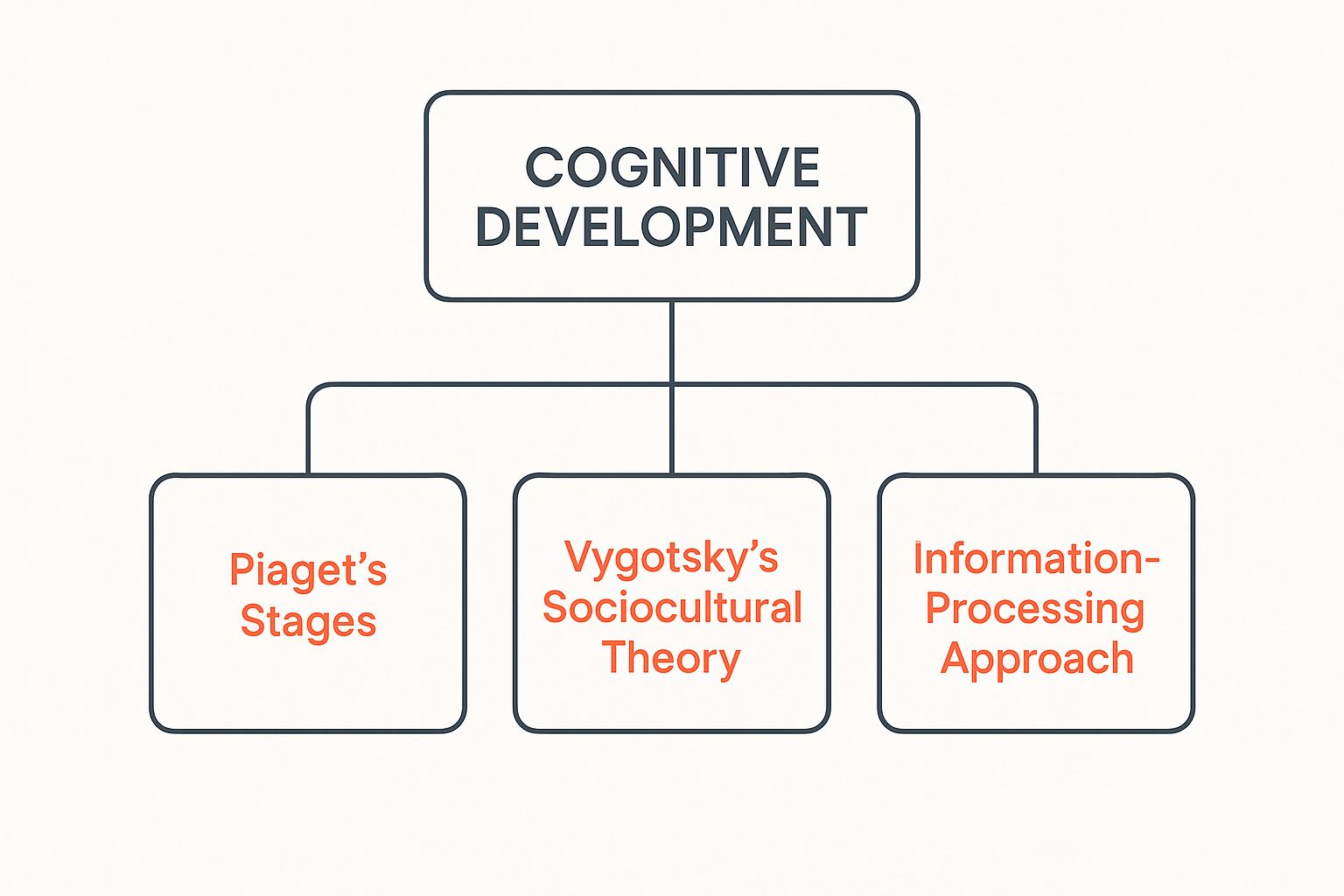
As you can see, each of these perspectives sheds light on a different, yet equally crucial, piece of the puzzle—from the internal stages they naturally go through to the profound influence of the people and environment around them.
This progression of thinking skills is so foundational that massive studies are dedicated to understanding it right from birth. The goal is to see how everything from genetics to daily interactions shapes these vital cognitive functions.
The best part? You're already the lead architect in this project, guiding their learning and discovery every single day.
Your Child's Cognitive Toolkit at a Glance
As you watch your child play and explore, you're seeing these cognitive skills develop in real-time. This table breaks down the core areas of cognitive development you'll see emerging in your child from ages 2 to 7.
| Cognitive Skill | What It Looks Like in Daily Life |
|---|---|
| Attention | Focusing on a puzzle for a few minutes without getting distracted by the dog barking. |
| Memory | Recalling the name of a character from last night's bedtime story. |
| Problem-Solving | Using a cushion to build a ramp for their toy car. |
| Language | Moving from two-word phrases to telling you a whole (and often hilarious) story about their day. |
| Symbolic Thought | Waving a stick around and declaring it's a magic wand that turns you into a frog. |
These are the building blocks we've been talking about. Each one is a tool they are learning to use, and with practice, they'll combine them in more complex and creative ways.
The World of Imagination for Your 2 to 4 Year Old
Have you ever watched your toddler pick up a banana and hold it to their ear like a phone? Or seen them transform a simple cardboard box into a spaceship bound for the stars? If so, you've had a front-row seat to one of the most magical periods of cognitive development: the preoperational stage.
This is the time when logic takes a backseat to pure, unadulterated imagination. It's a world where a blanket fort is an impenetrable castle and stuffed animals have very serious conversations.
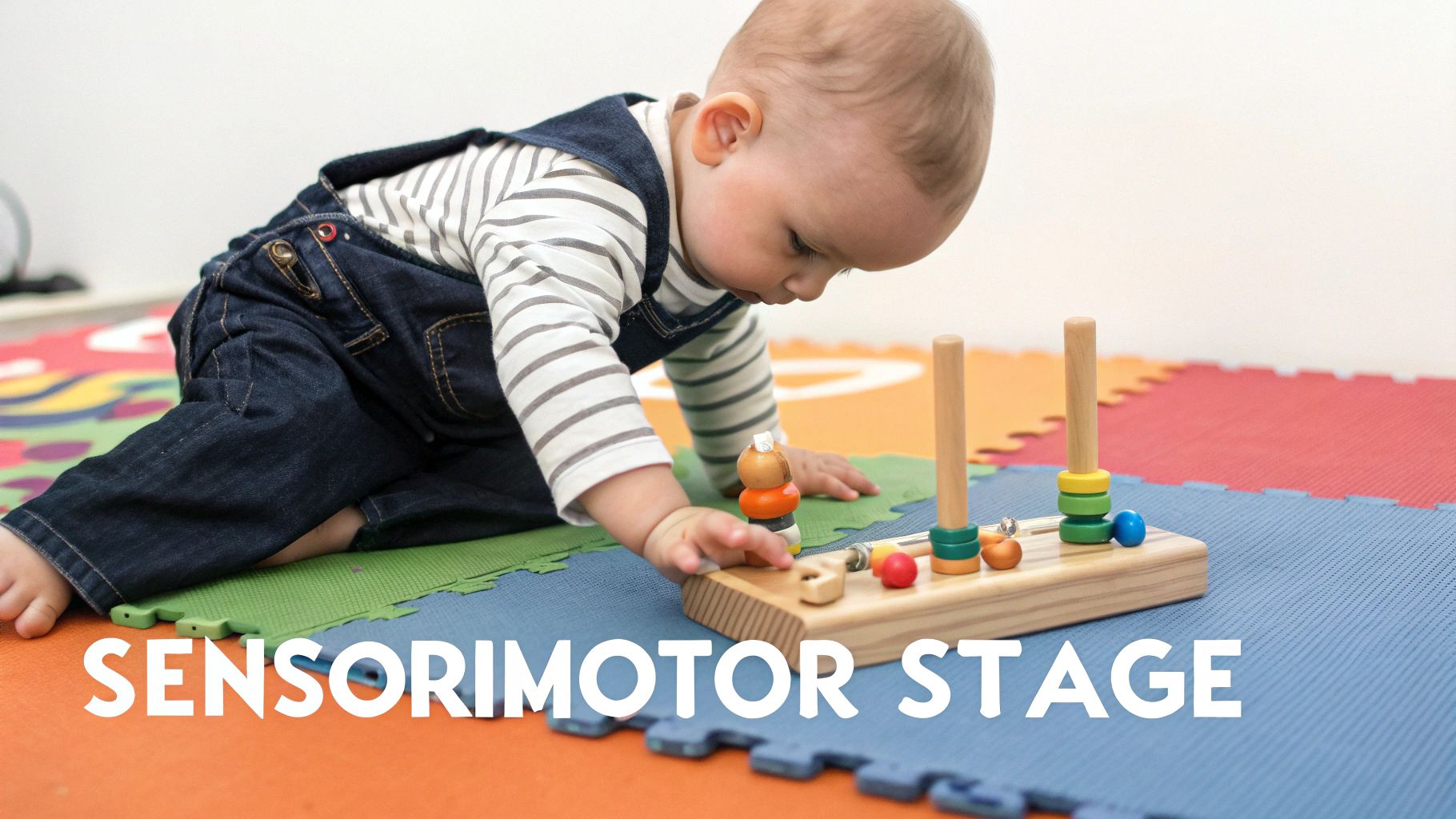
You might also notice their thinking is wonderfully self-centered. Ever been on a drive and heard them exclaim that the moon is following your car? That’s a perfect example of egocentrism. They genuinely see the world from a single perspective—their own. It isn't a sign of selfishness; it's just how their brain is wired at this age.
This imaginative play is far more than just cute antics. It's the hard work of childhood. It’s how they test out big ideas, practice empathy by bandaging a teddy bear's "sore paw," and solve problems in a world where they get to make all the rules. In fact, research repeatedly shows that rich pretend play is directly linked to stronger language skills, creative thinking, and emotional regulation.
Turning Pretend Play into Powerful Learning
So, how do you nurture this incredible burst of creativity? The best thing you can do is jump right into their world.
When they hand you an imaginary cup of tea, sip it with gusto. When they declare the floor is hot lava, hop onto the couch with them. This simple act of validating their reality shows them that their ideas matter and encourages them to explore even further.
Providing open-ended toys and exploring different creative games for kids are also fantastic ways to fuel their adventures. But what if you could offer them an entire universe where their choices actively shape the story?
This is where interactive stories truly shine for this age group. Imagine them deciding how to help a nervous dragon find its roar or choosing the kindest way to share a magical snack with a forest creature.
That’s exactly what we had in mind when creating Lunesia’s adventures. They aren’t just passive stories your child listens to; they are interactive journeys where every decision builds the narrative. It’s a way to turn screen time into a genuine tool for cognitive growth.
With Lunesia, your child is actively problem-solving, making empathetic choices, and building confidence with every tap. And for parents? It’s a chance you can feel good about. Your child is safely absorbed in a positive, ad-free world, giving you a guilt-free moment to finally drink your coffee while it's still hot.
Answering Endless Questions from Your 4 to 7 Year Old
Does it feel like you’re living with a tiny, relentless detective? If your home is constantly echoing with "why?" about everything from the color of the sky to why the dog has a tail, congratulations. You've officially entered the wonderfully curious ‘intuitive thought’ stage, which really blossoms between ages four and seven.
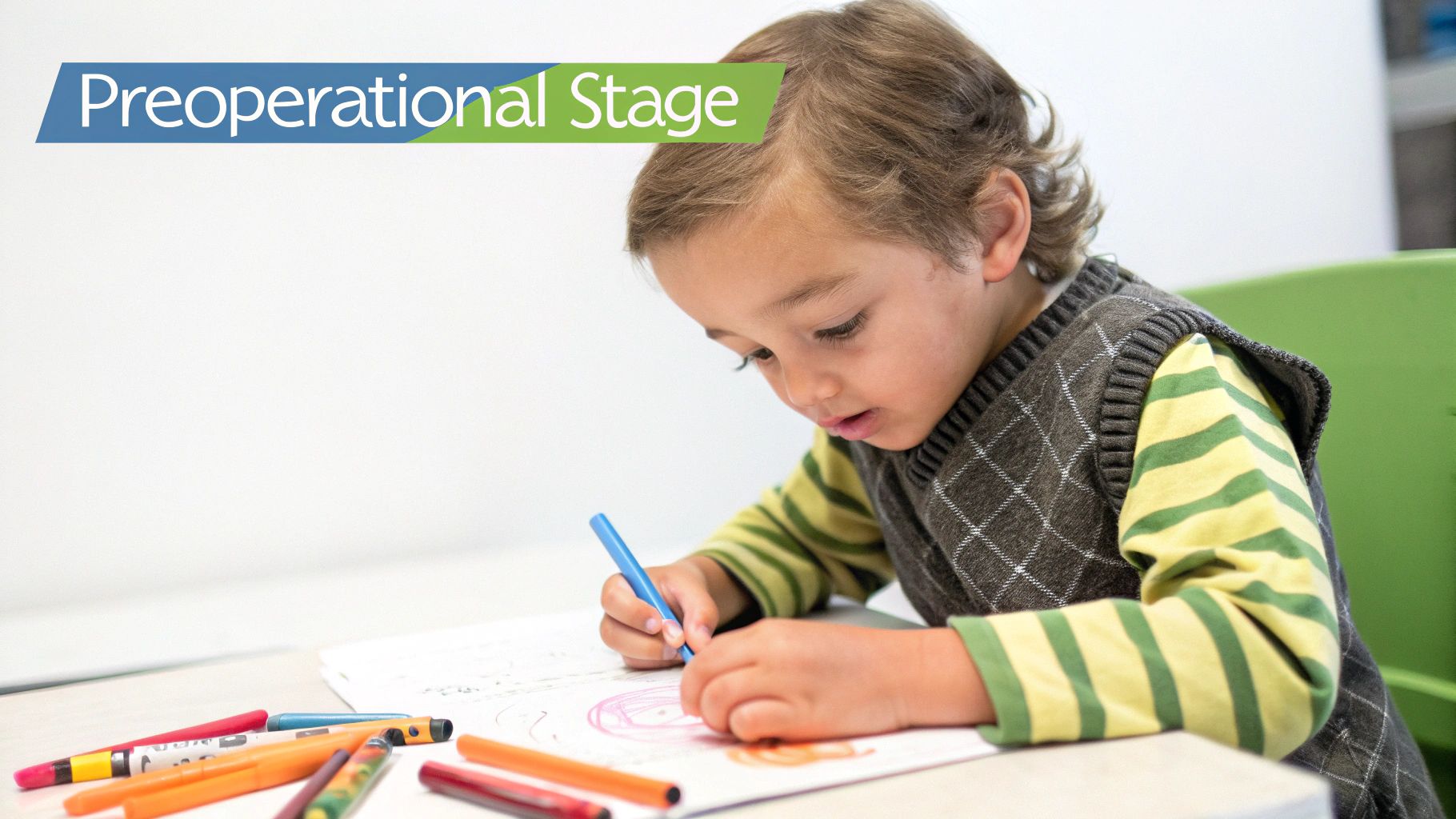
Their reasoning is starting to bloom, but it’s based more on gut feelings than on cold, hard logic. It’s a fascinating phase where they know things but can’t quite explain how they know them. This barrage of questions isn't a ploy to test your patience; it's their brain's way of trying to connect the dots and build a mental map of their world.
Fueling Curiosity Instead of Shutting It Down
Answering this waterfall of questions can be draining, but how you respond has a huge impact. Instead of just rattling off a quick answer, try gently flipping the question back to them.
When your child asks, "Why is the grass green?" you could say, "That's a great question! What do you think makes it green?" This simple shift transforms you from a walking encyclopedia into their thinking partner, empowering them to come up with their own ideas.
This approach doesn't just satisfy their curiosity for a moment—it teaches them the process of thinking critically, a skill that will serve them for the rest of their lives.
At the same time, you'll see the early stages of empathy. Their ability to see things from someone else's perspective is still developing, but it's there. You might notice them sharing a toy not because you told them to, but because they genuinely see their friend is sad. Nurturing this is just as important as answering their logical questions.
From Playtime to Problem-Solving Workshop
For kids this age, play is the ultimate problem-solving workshop. Every time they build a block tower that doesn't fall over, figure out the rules to a new game, or negotiate what happens next in make-believe, they’re flexing their critical thinking and planning muscles.
This is exactly why interactive experiences are so powerful. With an app like Lunesia, your child isn't just a passive listener—they're the hero making decisions that shape the story.
- Should the character share their magical berries? They’ll see firsthand how kindness changes the outcome.
- Should they take the scary-looking path through the woods? They’ll learn about courage and facing their fears.
These aren't just stories; they're safe, ad-free playgrounds for the brain. While your child is absorbed in an adventure, learning to think ahead and consider different points of view, you get a much-needed moment for yourself. You can relax without the guilt, knowing their screen time is actively helping them build cognitive skills and emotional resilience.
This kind of nurturing environment is critical, as early experiences profoundly shape a child's entire learning path. For a deeper look at this, global development tools that track early childhood progress offer fantastic insights.
Simple Ways to Boost Brainpower Every Day
Ever feel like you need a degree in child psychology just to be a good parent? Let’s toss that idea right out the window. You don't need expensive flashcards or complicated lesson plans to nurture your child’s growing mind. The truth is, the most powerful brain-boosting moments are already woven into your daily life—you just need to know how to spot them.
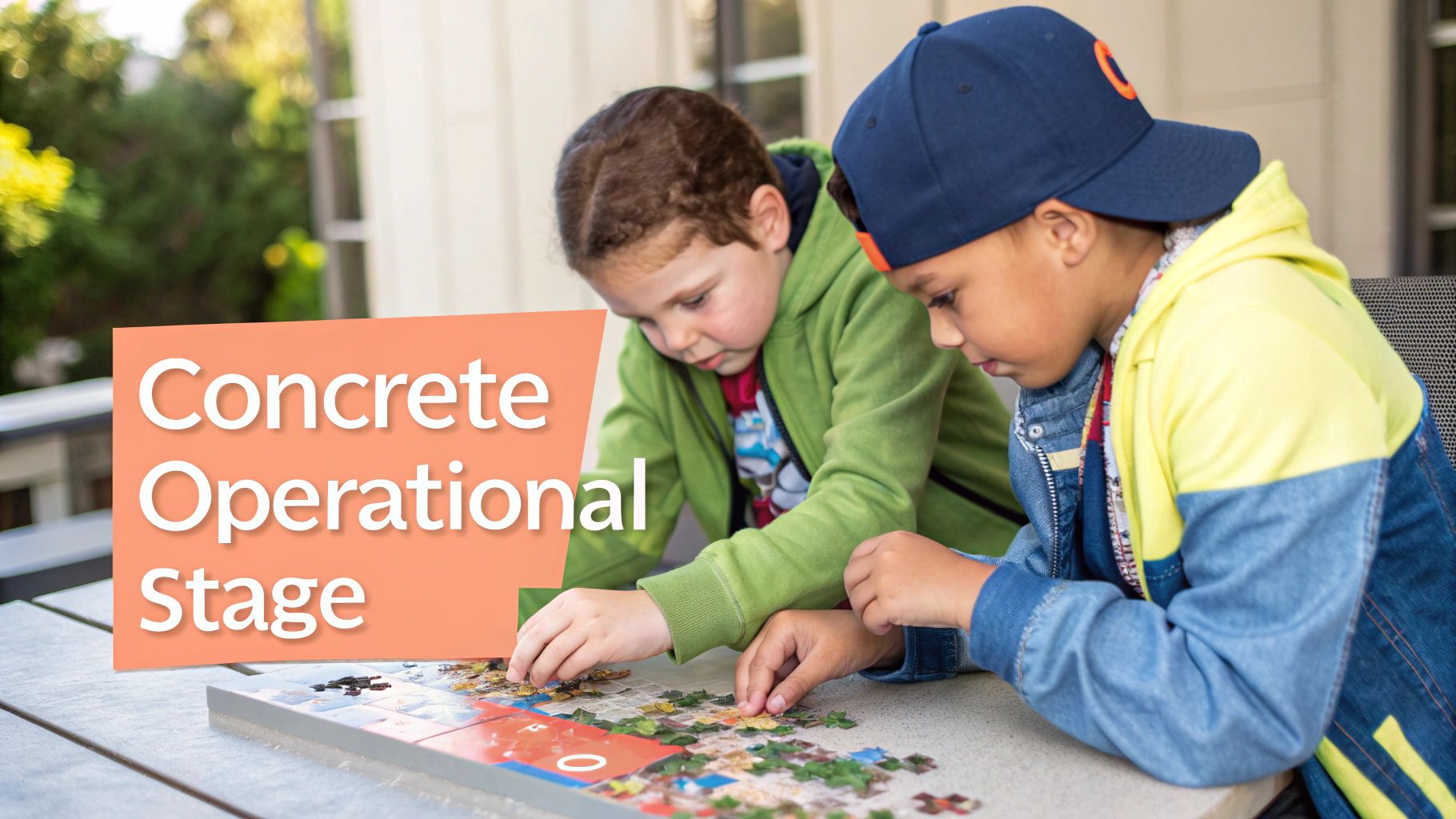
Think about your next trip to the grocery store. For you, it might feel like just another chore. But for your little one, it’s a living, breathing classroom.
You can easily turn the produce aisle into a game. Try asking, “Can you find all the red fruits?” or “Let’s count three yellow lemons for the bag.” Just like that, you’re practicing sorting, counting, and color recognition, and they have no idea it’s even a “lesson.” These small, intentional interactions are the secret sauce. They build neural pathways far more effectively than any worksheet because they’re rooted in connection and the real world.
Turn Everyday Moments into Learning Adventures
Ready for some simple, doable ideas you can start using today? The goal here isn't to add more to your to-do list; it's about reframing what you’re already doing.
- Become a Story Co-Pilot: At bedtime, instead of just reading, hit the pause button and ask, “What do you think is going to happen next?” This simple question ignites their imagination and gets them thinking about cause and effect. Better yet, let them co-create the story, handing them the keys to creativity and problem-solving.
- Embrace “I Wonder” Questions: On a walk, instead of just pointing things out, start wondering aloud. “I wonder why that bird is collecting all those twigs?” or “I wonder where that little ant is marching off to?” This models curiosity and nudges them to observe the world closely and form their own simple hypotheses.
- Give Choices, Not Commands: It’s a subtle shift, but it’s a big one. Instead of saying, “Put your coat on,” try offering a choice: “Do you want to wear the blue coat or the red jacket today?” This gives them a little bit of control and introduces them to the basics of decision-making—a core cognitive skill.
The goal isn’t to be a perfect teacher; it’s to be a curious guide. By inviting your child into these small thinking exercises, you’re building their confidence and showing them that their ideas have value. This foundation is crucial for developing strong analytical abilities later on.
When You Need a Helping Hand
Let’s be honest, some days you just don’t have the energy to turn the sock drawer into a lesson on patterns. That’s perfectly okay. It’s on those days that having a tool designed for this exact purpose can feel like an absolute lifesaver.
This is where an app like Lunesia comes in. Each interactive story is a guided exercise in problem-solving and emotional intelligence, all wrapped up in a captivating adventure. When your child is figuring out how to help a shy unicorn make a friend or what path to take through an enchanted forest, they’re not just playing a game—they’re practicing critical thinking in a safe, ad-free space. You can dive deeper into how these activities build a strong foundation in our guide on how to teach critical thinking skills.
It’s a true win-win. Your child is deeply engaged in a meaningful activity that enriches their mind, and you get a precious, guilt-free moment to recharge. You’re not just managing screen time; you’re investing it.
Helping Your Child Navigate Big Feelings
Ever seen a total meltdown because you gave them the blue cup instead of the red one? Or spent a solid thirty minutes trying to convince your child that, no, there really aren't any monsters hiding under their bed? These huge, overwhelming emotions aren't just frustrating little phases—they're a critical part of your child's cognitive journey.
Learning to understand and handle these intense feelings is a skill we call emotional regulation. Think of it as a cornerstone for building a healthy, resilient mind. So, how on earth do you guide them through the emotional storm without losing your own cool? It all starts with one simple, yet incredibly powerful, first step: validation.
From Tantrums to Teachable Moments
When your child is sobbing because their cookie broke in half, their world genuinely feels like it's falling apart in that moment. Telling them, "It's just a cookie, don't cry," dismisses what they're feeling. It sends the message that their emotions are wrong.
Instead, try getting down on their level and saying, "You are so sad that your cookie broke. I can see how upsetting that is for you."
This doesn’t mean you give in to every single demand. It simply means you acknowledge that their emotion is real to them. You can validate the feeling ("I know you're angry we have to leave the park") while still holding the boundary ("but it's time to go home for dinner"). This simple shift builds trust and teaches them that their feelings matter, even if their behavior needs a little redirection.
The ability to manage emotions and adapt to challenges is more than just a life skill; it’s a predictor of future success. Investing in this emotional toolkit from a young age helps build the cognitive resilience and adaptability needed to thrive in a rapidly changing world.
Building this foundation early on is absolutely crucial. Poor cognitive development in youth actually poses a significant economic threat, costing the global economy roughly $5 trillion each year. Helping children build these emotional skills is a powerful way to set them up for long-term success. You can dive deeper into how youth brain health impacts the global economy on weforum.org.
Using Stories to Practice Empathy
One of the best ways to explore tricky emotions is through stories. When kids see characters face their fears, work through frustration, or learn how to be kind, they get to practice these skills from a safe distance. It’s like an emotional flight simulator.
This is exactly where Lunesia’s interactive adventures shine. The stories are built to be more than just entertainment; they are practice fields for empathy and resilience.
- When a character feels scared: Your child gets to choose a brave action to help them.
- When a character is treated unfairly: Your child decides how to stand up for them with kindness.
By guiding the characters through these challenges, your child is actively building their own emotional toolkit. They learn about cause and effect in a way that just feels like a fun, exciting game. It's a fantastic way to turn screen time into a meaningful lesson packed with good values.
And while they’re totally absorbed in a safe, ad-free world, you get that precious, guilt-free time for yourself. You can relax knowing they aren't just occupied—they're growing. For more hands-on ideas, check out our guide on emotional intelligence activities for kids.
Your Role as a Guide, Not an Expert
Do you ever feel the relentless pressure to have all the answers for your child? It’s an easy trap to fall into. Let's take a deep breath and set that impossible expectation aside.
When it comes to your child's cognitive development, your most important job isn’t to be a teacher with a rigid lesson plan. It's to be their safe harbor—their trusted, loving guide.
Your real power lies in creating a home where curiosity is the biggest adventure and mistakes are just interesting plot twists. It’s about building a secure, loving bond that gives your child the confidence to explore their world, knowing you're always there to come back to. Trust me, you are already doing enough.
Becoming Your Child's Co-Pilot
So, how do you nurture this incredible growth without turning your living room into a high-pressure classroom? It’s actually simpler than you might think. It’s all about modeling a growth mindset and showing them that challenges are exciting, not terrifying.
Here are a couple of ways to put this into practice:
- Celebrate the Effort, Not Just the Win: When they finally get that wobbly tower of blocks to stand, praise their persistence. Saying something like, "Wow, you worked so hard to make it balance!" teaches them that the process of trying is what really counts.
- Embrace "I Don't Know, Let's Find Out!": You don’t need to have a scientific explanation for why the sky is blue on hand. Admitting you don't know the answer and then exploring it together is one of the most powerful lessons you can share.
This is where a tool like Lunesia can feel like a co-pilot on your parenting journey. It’s built to support your role, not take it over.
While your child is happily lost in an ad-free story, making choices that shape their character and sharpen their thinking, you get a moment to breathe. You aren’t outsourcing your job; you're just using a great resource that helps you be the calm, present parent you want to be.
Think of it as the ultimate guilt-free support system. Your child is safe, engaged, and learning crucial skills like kindness and problem-solving. This gives you precious time to recharge, and that balance isn’t a luxury—it’s essential for building the connected, happy family life you deserve.
Your Questions Answered
Watching your child’s mind grow is an incredible experience, but it’s bound to come with a few questions. Let's tackle some of the most common ones we hear from parents.
How Do I Handle Screen Time?
It’s easy to get caught up in counting the minutes, but the real question isn't about how long they're on a screen—it's about what they're doing. There's a huge difference between zoning out to a video and actively participating in a story.
Think of it as the difference between being a passenger and a driver. Apps like Lunesia put your child in the driver's seat. They aren't just consuming content; they're making decisions that steer the narrative, which actively builds their problem-solving and critical thinking skills in a safe, ad-free space.
What If My Child Isn't Hitting Milestones as Quickly as Their Peers?
First, take a deep breath. Every child develops at their own pace, and the comparison game is one you can’t win. If you have real concerns, your pediatrician is always your best starting point for trusted advice.
At home, your role is to create a positive, playful environment where they feel safe to explore. This is where tools like Lunesia can be a gentle and effective support. The stories are all about making choices, not about getting a "right" answer, which helps nurture skills and build confidence without any added pressure.
How Can I Help Them Solve Problems Without Just Giving the Answer?
This is a classic parenting puzzle! The trick is to shift from being the "answer person" to being their "thinking partner." When they're stuck, resist the urge to solve it for them.
Instead, ask open-ended questions. "What have you tried so far?" or "What do you think might happen if you did that?" This simple change helps them build the mental muscles to figure things out on their own. Interactive stories are a fantastic training ground for this, constantly presenting small challenges where your child has to think through the consequences to see what happens next.
Ready to make screen time an adventure in learning? With Lunesia, your child doesn't just watch a story—they become the hero. They’ll learn about kindness, courage, and creative problem-solving, one choice at a time. Start your free trial today and discover a world of interactive learning at Lunesia.
